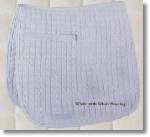
Contour Wither Relief Dressage Pad
$32.95
| |
|
Don't Want to Purchase Your Own Horse? Try Leasing!
|
Many horse lovers have dreamed of that opportunity of buying their own horse. Unfortunately, it is an expensive proposition, and one not to be entered into lightly. There are so many issues to think about – the cost of the horse, boarding fees, vet bills, farrier bills, . . .and the list goes on. To help a potential horse owner understand the full commitment – both financial and personal – many people recommend leasing a horse.
Leasing affords you the opportunity to understand all that is involved with owning your own horse without taking that “final” step. You can share the costs of the boarding, feeding, and care of the horse, while also being able to ride more frequently and develop that bond between horse and human. It is also an ideal option for the parents of a child who wants his or her own pony, but aren’t sure whether that child will stick with it. Leasing gives you the opportunity to find out how committed you or your child can be to the animal itself, without you or, more importantly, the horse suffering.
Once you have made the decision to lease, the next step is to find a horse whose owner is willing to make such an arrangement. In your search, you will discover that there are a number of owners who are interested in leasing their horses out. These owners appreciate the financial assistance this brings, as well as the opportunity to have their horse exercised when they may not always be able to do get to the barn themselves. If you are taking lessons at a barn, often one of the owners there would be willing to lease their horse. This also makes it easier to schedule riding times around each other so there isn’t the possibility of accidentally overworking the horse in one day. If you are not connected with a specific barn, then you can always call a local one and see if any of the owners are interested in leasing their horses out. Of course, many times people who have advertised their horses for sale are willing to lease them instead. This is especially helpful if you do find you can make the commitment to purchase – you already know the horse, its capabilities, and your ability to work with it. In some of these instances, depending upon the agreement struck between horse owner and lessee, the lease payments may even be put towards the purchase price.
In any case, you always want to make sure you are honest with the owner regarding your capabilities. Just like with buying a horse, you don’t want to overface yourself with leasing a horse that you can’t ride. If you are not familiar with the horse already, as you may be if you take lessons there, then you should watch the owner ride the animal and ask questions regarding the horse’s behavior (e.g., ground manners, bad habits or vices, health problems, under saddle issues). As with purchasing a horse, it is recommended you take a knowledgeable horse person along with you, either your riding instructor or someone else who has some experience with horses, to help look for problems or things you may have missed.
After deciding upon the horse, you will most likely sign some type of contract that establishes, in writing, the arrangement between you and the owner. One of the key points will be the payment plan and what those payments include. For example, while some arrangements only consist of payments for either half or the entire boarding fee, others may incorporate health care and farrier bills, as well. If you are one of those individuals who intends to purchase your own horse, then the latter arrangement could be beneficial. You would be able to budget for all those “hidden” costs that can add up and make the ownership experience unwieldy.
The contract may also include scheduling times for riding and the horse’s availability. For instance, there may be certain restrictions if the owner decides to show the animal. At the same time, you may be able to arrange with the owner for your own chance to compete. Obviously, you will want to work closely with the owner to make sure all steps are taken to ensure its soundness up to the event, during, and after (as you would with any horse).
Depending upon where the horse is located – on the owner’s farm or a boarding facility - another aspect of the arrangement may include caring for the horse, such as feeding, cleaning the stall, turn-out, bathing, etc. The contract may also discuss the steps to be taken in case of injury or illness. Unless you are given permission to contact the vet in those instances, you will definitely want to notify the owner in order that he or she may act upon it immediately. For obvious reasons, it is most important that any directions regarding the care of the animal involve the horse’s owner. If not, the end results can be extremely detrimental to all three parties – the owner, the horse, and you.
Regardless of what the contract includes, it is important to read the document closely. You will want to make sure that you will be in compliance with all the terms of the contract. Moreover, you will want to make sure that all of the terms are fair and reasonable
Leasing is a great choice to enable an individual to gain that vicarious experience of “owning” a horse, determine his or her level of commitment to the animal, and ascertain his or her capabilities as a rider before making the big purchase. Ultimately, this is better for you and the horse.
|
|
|
|
|
|
|



